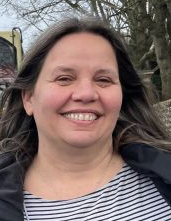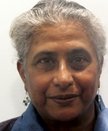BNA Annual General Meeting 2025
1st April 2025
13th Mar 2023
We're delighted to welcome and congratulate two members on being elected to positions on the British Neuroscience Association (BNA) Council and Committee: Sarah King as the new Association Secretary, and Vasanta Subramanian as Equity, Diversity and Inclusion (EDI) Representative. Both will officially start their roles at the 2023 International Festival of Neuroscience.
We also take the opportunity to thank the outgoing holders of these positions, who have reached the end of their term of office; Zoe Kourtzi as Association Secretary, and Emma Yhnell as EDI Representative. The BNA has benefited greatly from their freely-given time and committment.
 Assocation Secretary: Sarah King, Reader in Behavioural Neuroscience at the University of Sussex
Assocation Secretary: Sarah King, Reader in Behavioural Neuroscience at the University of SussexAs Association Secretary, Sarah will become a Trustee and Officer - one of the highest-ranking officials of the BNA, alongside the President and Treasurer. Sarah is already well-known to the BNA community through her roles as Local Group Representative (since 2004) and, more recently, as Chair of the BNA Public Programme 'BYOB-Brighton'. We look forward to working with Sarah in her new post on the BNA Council.
Manifesto:
I have been an active member of the BNA and a local group rep for Sussex since returning to the UK (from postdoctoral studies in the USA) to a lectureship in the School of Psychology at the University of Sussex (2004). The BNA is my society, and I have been to every festival since I joined and most of the Christmas symposia, including presenting ‘Why Santa drinks’ in 2014.
For the last three years I have upped my involvement in the BNA by leading and organising the public programme for the upcoming 2023 Festival of Neuroscience. This has been one of the most rewarding parts of my job over the last 12 months or so, and we have made a Brain Bus (www.sussexbrainbus.org) and put together an exciting programme of events that has already started and will culminate at the festival at the end of April. This programme seeks to inspire and inform the local community and tourists of Brighton about neuroscience and its possibilities (our programme targets all ages, from school children to older adults). I hope that this experience can serve as a legacy, and I can pass on ideas and advice to future BNA public programme organisers.
At Sussex I have taught neuroscience to both medical students (BSMS) and psychology undergrad and masters students. I was instrumental in the success of a bid to the Alzheimer’s Society for a Doctoral Training Centre (DTC), from which we have graduated over 8 PhDs, and was the Director of Doctoral Studies (DDS) in Psychology for 5 years (including the pandemic shutdowns). During this time I led the recruitment and pastoral support for our PhD student and set up a number of initiatives to support them with doctoral tutoring, living and studying through the pandemic, and co-locating them in their own building. Feedback from PhD students suggests I was successful in these initiatives and the Beatrice Edgell Research Hub (BEED) is now the location of choice for PhDs to get a desk.
For my own research I hold a Home Office Project Licence and I have taken an active role in the management of the Sussex Biological Research Facility, including sitting on high level committees and recruiting staff. The current work in my lab takes an open science approach, developing new behavioural testing equipment and scripts that will allow other labs to easily build, implement and replicate the same procedures at a relatively cheap cost. I am also committed to maintaining a dialogue between researchers across disciplines (animal and human studies) to allow the rapid translation of findings in both directions to speed up the application of research and maintain its relevance across species.
I would like to bring these experiences to the role of Secretary of the BNA, where I can help to lead strategies at a national level to support early career researchers, drive public engagement in neuroscience, and promote the ongoing BNA work on credibility and open science.

With the BNA Scholar Programme now entering its third year, and inclusion becoming an ever more important priority area for the Association, we are delighted to welcome Vasanta to the BNA Committee as EDI Representative to help guide the BNA in this work.
Manifesto:
As a woman and a non-white member of the faculty in the Department of life Sciences at the University of Bath, I am in a minority among senior academic staff. This, I believe is true of many Institutions and means that for women and ethnic minority students there is a paucity of role models and mentors.
Locally, I have provided opportunities for female school and undergraduate students to spend summers in my laboratory. More recently, together with a final year undergraduate student, we interviewed several ethnic minority women faculty in Life Sciences across the UK and created podcasts, which you can find on sound cloud. Hearing about the experiences of these Senior women scientists in academia was an eye opener and I believe much remains to be done to create a level playing field.
In addition, the recent report on racism from the Wellcome Trust and the report from the National Science Foundation USA, published in e-Life reveal that much still needs to be done.
I am passionate about bringing this change. I believe with my academic credentials and personal experiences as a woman scientist of colour, I will be committed to this post and bring new perspectives to bring about positive change.